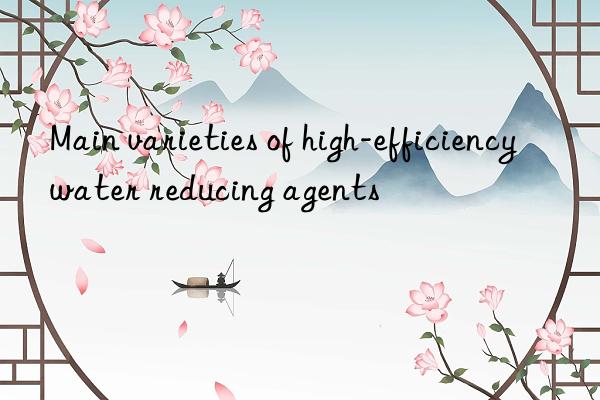
The high-efficiency concrete water-reducing agents developed and produced in China have formed two major categories in the 1990s. One is a synthetic single-component high-efficiency water-reducing admixture, and the other is a composite multi-component high-efficiency water-reducing admixture. Single-component high-efficiency water-reducing agent, also known as superplasticizer, has a very significant water-reducing and enhancing effect on cement and concrete. However, it is often difficult to meet the various requirements for the workability of fresh concrete and the specific properties of hardened concrete. Therefore, it is currently used directly. As the number of projects gradually decreases, compound high-efficiency water-reducing admixtures are used instead.
Compound high-efficiency water-reducing agents are called high-efficiency pumping agents, high-efficiency antifreezes, etc. because they are mixed with other components to meet the needs for different properties of concrete.
Synthetic high-efficiency water-reducing agents can be divided into several categories according to their main chemical structures:
1. Monocyclic aromatic hydrocarbons - sulfamate high-efficiency water-reducing agents
One of the basic characteristics of this type of high-efficiency water-reducing agent is that the concrete slump is rarely lost within 2 hours.
The second of its basic characteristics is that the compressive strength growth is higher than that of coumalon resin-based, naphthyl-based, and melamine resin-based high-efficiency water-reducing agents, which is very suitable for formulating high-strength and ultra-high-strength concrete.
The third basic feature is its wide adaptability to various cements, good adaptability to ordinary cement, slag cement and ordinary cement with different pozzolanic admixtures, strength development and collapse. The change (loss) of drop over time remains consistent.
Its fourth basic characteristic is that the water-reducing agent has a large effect and the dosage range of the maximum effect is small, that is, it is sensitive to the dosage. As the dosage increases, the concrete water reduction rate, expansion, and various Age strength has been greatly improved.
The main raw materials of this water reducing agent are phenol and p-aminobenzene sulfonic acid.
2. Naphthyl superplasticizer
This is by far the largest and most widely used superplasticizer in the world and in my country. This is beneficial to its ability
Easily made into brownish-yellow dry powder and can be stored for a long time.
One of its characteristics is that all performance indicators are in line with the standards of high-efficiency water-reducing admixtures. When the dosage exceeds 1%, it has slight retardation and causes concrete to bleed.
The second characteristic is that the slump loss is relatively large. After half an hour, only 60% of the remaining slump is large.
The third feature is that it has good compatibility with high-efficiency and ordinary water-reducing agents except polycarboxylate water-reducing agents.
Its main raw materials are industrial naphthalene, concentrated sulfuric acid and formaldehyde.
3. Anthracene-based high-efficiency water-reducing agent
Anthracene-based water-reducing agent is similar to naphthyl-based water-reducing agent. It is also made of organic matter fractionated from coal tar as raw material. However, anthracene with a terphenyl ring is used as the raw material, and the final product is a dark brown dry powder.
One of its characteristics is that it is mixed into concrete to reduce water, and the enhancement effect is slightly smaller than that of naphthyl water-reducing agent.
The second characteristic is that it will increase the air content of concrete to 3% or higher, so the usage amount is generally not very high and is often mixed with naphthyl water-reducing agent.
4. Melamine resin sulfonate-based high-efficiency water-reducing agent
Melamine resin sulfonate-based high-efficiency water-reducing agent and naphthyl-based high-efficiency water-reducing agent have the effect of reducing Portland cement. The water rate and strength growth rate are almost the same, but the disadvantage of large slump loss is also different. However, the effect in sulphoaluminate cement and aluminate cement is much better than that of naphthyl high-crosslinking superplasticizer. Melamine resin-based superplasticizer has good adaptability to aluminate cement, so melamine resin-based superplasticizer is also used in refractory concrete. Another feature of it is that the products are all colorless or light yellow liquids and there are no powder products.
The main raw materials for producing this kind of water reducing agent are sodium sulfite, formaldehyde and melamine.
5. Ketosulfonate high-efficiency water-reducing agent
It is also called aliphatic or aldehyde-ketone condensate high-efficiency water-reducing agent. It is named after acetone and formaldehyde as the main raw materials. The product is a dark purple aqueous solution. When mixed into concrete, sometimes it will cause delayed bleeding, staining the hardened concrete, and it will gradually fade after curing for a period of time. The dyeing defects can be changed without acetone synthesis, and different synthesis processes will also make the color lighter.
6. Polycarboxylate-based high-efficiency water-reducing agent
Polycarboxylate-based high-efficiency water-reducing agent is the fastest-growing high-performance water-reducing agent in the world in the past 20 years, because it is Ternary or quaternary compounds are polymerized, so there are many varieties, and their properties are also slightly different. This branched graft copolymer has carboxylic acid groups and xanthic acid groups as well as other functional groups. It is the most rapidly developed synthetic high-efficiency water-reducing agent in the world in the past 10 years.
This kind of water-reducing agent has many kinds of raw materials, and the commonly used ones are polyacrylic acid, maleic anhydride, maleic anhydride, etc. </p

 微信扫一扫打赏
微信扫一扫打赏

